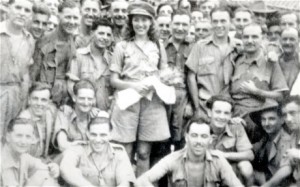As Britain commemorates the 75th anniversary of the Blitz, I want us to look back at the Second World War and how one remarkable singer kept the morale of the people high during a time of uneasiness. Dame Vera Lynn is recognised as the most popular singer of her time and has been dubbed the ‘Forces Sweetheart,’ but there was some uncertainness of her career as she was also deemed very controversial.
Vera was born on the 20th March 1917 to a working class family in the East End of London. At the age of eighteen, she recorded her first song, Up The Wooden Hill To Bedfordshire, and was well established by the time the war broke out. Her voice and her sentimental songs captured the heart of the nation. In 1940, she released her song We’ll Meet Again, which gave comfort to the people on the home front and also to those fighting overseas. Lynn gained popularity throughout the war and in 1942 was given her own radio programme on the BBC, Sincerely Yours, where she communicated with soldiers overseas and sent those heartfelt messages to loved ones at home. The programme brought people together on the home front by establishing a community that didn’t have to manage with their feelings alone.
But then it became controversial. In March 1942, The Daily Telegraph published an open letter which blamed the BBC for the people’s half-hearted attitude towards the war and that they weren’t taking it very seriously. The BBC took this complaint literally, and the controller of programmes, Basil Nicholls, identified the programme Sincerely Yours and sentimental songs were to blame. He claimed that singers such as Vera Lynn and songs like hers undermined the war effort, leading to more soldiers feeling homesick and not focusing on the fight. In her autobiography, Some Sunny Day, Vera remarked, “As I saw it, I was reminding the boys of what they were really fighting for, the precious personal connections rather than the ideologies and theories.” The radio programme was banned, but only for a short while as there was an overwhelming response by angry listeners: in just four weeks letters critical of the cancellation outnumbered appreciative ones by four to one.
Vera not only had her BBC radio programme, but also travelled to the front line to see soldiers with many ENSA (Entertainment National Service Association) entertainers. These people were remarkable in that they risked their own lives to give soldiers a well needed morale boost when spirits were low.
Vera Lynn was the voice of the ordinary people; she kept many people’s morale high despite what few upper-class people thought. So when we commemorate the spirit of people during the Second World War, let’s also remember those who kept their spirits up.
For more information about Vera Lynn, check out:
Some Sunny Day: My Autobiography, by Vera Lynn
Victory Through Harmony: The BBC and Popular Music in World War 2, by  Christina L. Baade
-Charleigh Powell
Junior Girl
Girl Museum Inc.


Well done Charleigh, a magnificent piece of literature. True in every respect.